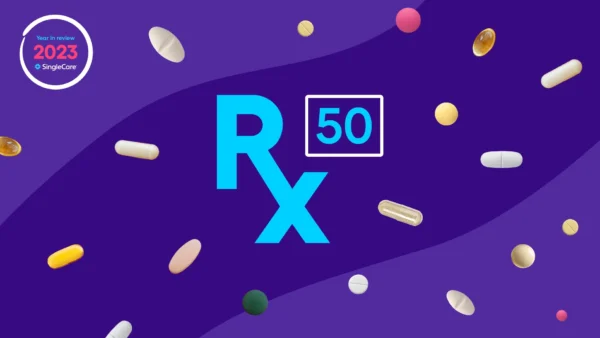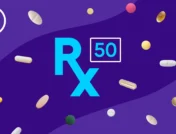Most years, summertime means backyard barbecues, picnics at the park, and plenty of fun in the sun. While things may look a little different in 2020, thanks to COVID-19, it’s usually a time of the year when many people are actively involved in recreation, and paying attention to their physical health. Perhaps that’s one reason why the most popular prescriptions filled with SingleCare in June all happen to be supplements; hematopoietic agents to be precise—including iron, vitamin B12, and folic acid. These agents improve the quality of the blood and may be used to treat anemias.
These are the ones that took the top spot in June, according to SingleCare data:
The most common reason these supplements would be prescribed to a patient is when he or she is deficient in them, explains Jesse P. Houghton, MD, FACG, senior medical director of gastroenterology at Southern Ohio Medical Center. So, how do you know if you have a deficiency? Let’s take a look at these popular supplements individually.
RELATED: 9 common nutrient deficiencies in the U.S.
FeroSul and ferrous sulfate (iron supplements)
Ferrous sulfate and FeroSul, a brand-name version of ferrous sulfate, are iron supplements used to treat iron-deficiency anemia. “Iron deficiency may result from inadequate dietary intake, malabsorption (from conditions such as Celiac disease), or from losing blood (through the GI tract or during menses),” says Dr. Houghton. The symptoms of iron-deficiency anemia include unusual fatigue, pale skin, shortness of breath, headaches, and dizziness.
If iron deficiency is suspected, your doctor may run a blood test to determine whether or not a supplement is necessary. “The ‘iron panel’ that we typically order includes an iron level, TIBC (total iron binding capacity), percent iron saturation, and ferritin,” says Dr. Houghton. In addition to supplements, iron deficiency anemia can be treated by eating foods that are high in iron including beef, organ meats, green leafy vegetables, seeds, nuts, and beans.
Many people enjoy running during the summer months, and studies have shown that some endurance athletes (especially women) can run low in iron, which may help to explain why iron supplements are popular in June. Taking too much iron can potentially lead to problems in the liver and heart, however, so it’s important to consult with your healthcare provider before starting iron supplementation.
RELATED: Anemia treatments and medications
Folic acid
Folic acid is a type of B vitamin that helps the body produce and maintain new cells. Spinach, liver, asparagus, and Brussels sprouts are among the foods with the highest folate levels. According to Dr. Houghton, when it comes to deficiencies (in comparing iron, vitamin B12, and folic acid) “low folate levels are the least common.” The symptoms of folic acid deficiency include fatigue, mouth sores, tongue swelling, and other symptoms of anemia such as lethargy, pale skin, weakness, and mood changes.
So, why do prescriptions for folic acid spike in June? “There is some research that states folic acid decreases during summer months due to high solar radiation and UV light exposure,” says Enchanta Jenkins, MD, MHA, an OB-GYN in California. One study found that the risk of folate deficiency was 1.37 times greater in summer than in winter.
Additionally, studies have shown that summer may be a good time to conceive in terms of birth weight. Mothers who became pregnant in June through August gave birth to infants who were, on average, about 8 grams heavier than in other months. The CDC recommends that all women of reproductive age take 400 micrograms (mcg) of folic acid each day, in addition to consuming food with folate from a varied diet, to help prevent some major birth defects. According to Dr. Jenkins, folic acid 1mg may be prescribed to pregnant women who cannot take prenatal vitamins (sometimes due to nausea and emesis). She also recommends that women who have had a prior pregnancy loss take 5 mg of folic acid during the first trimester.
RELATED: Why pregnant women need to take folic acid
Cyanocobalamin and vitamin B12
Vitamin B12 supplements, such as cyanocobalamin, are prescribed to treat pernicious anemia and vitamin B12 deficiency. Vitamin B12 is an essential vitamin that’s important for the brain and nerves as well as the formation of red blood cells. Most people get enough vitamin B12 from their diet, but those who follow a strict vegan diet could develop a deficiency. “Low B12 levels typically result from inadequate dietary intake over a long period of time (it takes months or years for our B12 levels to become low), or malabsorption from conditions like Crohn’s disease or from previous partial bowel resection surgery,” says Dr. Houghton.
Vitamin B12 deficiency (or problems with absorption) could lead to anemia, and cause symptoms such as weakness, heart palpitations, nerve problems, glossitis (inflammation of the tongue), gastrointestinal issues, yellowing of the skin, and vision loss.
Vitamin B12 use may spike in the summer months because some weight loss clinics advertise high doses of the supplement (often in the form of injections) as a way to increase energy and boost your metabolism. However, there is little to no evidence to support the claim that vitamin B12 injections aid weight loss. “They will likely only help if you have a B12 deficiency,” Dr. Jenkins says.
The start of summer is a popular time for supplements, but it is important to always consult your healthcare provider if you think you may have a deficiency. Your physician can give you the proper tests to determine whether a supplement is right for you, and in what dosage.











